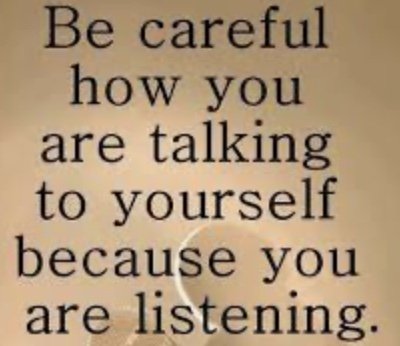Lesson 6 The Practice: Self-Talk
“All that we are is a result of what we have thought. ”
The Power of Self-Talk
The dialogue we have with ourselves shapes our confidence, focus, and overall performance. Positive self-talk reduces anxiety, builds resilience, and helps us stay calm and concentrated under pressure. Conversely, negative self-talk amplifies stress, focuses our attention on failures, and hinders our ability to perform at our best.
Mindfulness enhances our awareness of this inner dialogue. By noticing our thoughts, we can evaluate whether our self-talk is helpful or harmful, supportive or self-sabotaging, and choose to respond with intention rather than habit.
Consider this: Dr. Fred Luskin’s research reveals that 80% of our daily 60,000 thoughts are negative. This negativity bias can feel even stronger on the tennis court, where self-criticism often dominates. Harsh self-talk can hijack our focus and confidence, leaving us feeling like our own worst enemy.
Reframing the Story
Ask yourself: What would change if you replaced self-criticism with encouragement?
Imagine speaking to yourself as a supportive coach or trusted friend.
Replace harsh judgments with constructive and compassionate observations.
Rewrite your inner dialogue to reflect possibility and positivity.
“You are not your thoughts; you are aware of your thoughts. You are not your emotions; you feel emotions.”
Stress often stems from the stories we tell ourselves. Since we’re always narrating a story, why not make it a good one? True strength lies in recognizing that we can shift our narrative. We have a choice.
Here’s a reminder:
You are not your thoughts. You are the one aware of them.
Thoughts are real because we experience them, but they are not always true.
You don’t have to believe every thought, nor act on it.
Let your thoughts come and go like clouds passing in the sky. No action is required.
“You are the sky. The clouds are what happens, what comes and goes.”
On-Court Tip: Harnessing Positive Self-Talk
This week, become aware of your self-talk both on and off the court. Positive self-talk keeps you grounded, confident, and focused, especially during high-pressure situations.
Here’s how to practice it:
Replace negativity with affirmations:
Create short, powerful phrases to refocus your attention. Examples include:I’ve got this!
I trust my training.
One ball at a time.
I am confident and capable.
Stay task-focused:
When negative thoughts creep in, redirect your mind to the present moment by:Slowing your breath.
Watching the ball intently.
Committing fully to your footwork and preparation.
Practice mindful observation:
Notice negative thoughts without judgment.
Label them as “just thoughts,” and let them go.
Refocus on what truly matters in the moment.
Take a moment to notice the difference between supportive and critical self-talk. Which one keeps you calm, focused, and confident? Which one undermines your performance and energy?
As you practice positive self-talk, you’re not just elevating your tennis game—you’re building resilience, self-compassion, and confidence to face life’s challenges with strength and clarity.
“No one shall tell whether you are winning or losing by your body language.”
Body language is a powerful form of Self-Talk
It reflects and reinforces your mental state, creating a feedback loop between your mind and body. Becoming mindful of your body language is essential because it not only affects your own performance but also influences how your opponent perceives you.
Maintaining neutral or positive body language—regardless of whether you're winning or losing—is a key aspect of mental toughness in tennis. Negative body language, such as slumping shoulders, shaking your head, or looking frustrated, can inadvertently boost your opponent's confidence, signaling vulnerability.
To elevate your performance, practice adopting a composed and confident demeanor at all times. Walk with purpose between points, hold your head high, and take deep, steady breaths. These physical actions can help reset your mindset and project resilience, even in challenging moments. Over time, this habit can become a crucial mental weapon, enabling you to maintain focus, composure, and competitive intensity throughout the match.
“Mindfulness gives you time. Time gives you choices. Choices skillfully made, lead to freedom. You don’t have to be swept away by your feelings. You can respond with wisdom and kindness rather than habit and reactivity.”
“Our mental attitude transforms a situation into either a problem or an opportunity.”
Net Errors are mental mistakes. You can simply avoid them by aiming higher, a tactical choice
Wide Errors are mental mistakes. You can reduce them by simply adjusting your target with more margin of error
Long Errors are physical mistakes. Tennis is difficult, and by aiming middle with height you greatly reduce net and wide errors but now you need to add enough topspin to bring the ball down. Long errors are the best errors to make BY FAR!
“If you make every game a life-and-death proposition, you’re going to have problems. For one thing, you’ll be dead a lot.”
The first step in solving a problem, is recognizing the problem exists.




